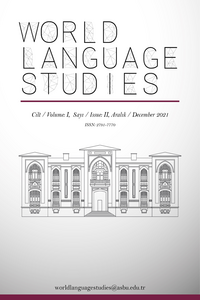Macbeth ve Kara Kitap Eserlerinin Yapısöküm Teorisi Işığında Karşılaştırmalı İncelemesi
Shakespeare'in Macbeth ve Orhan Pamuk'un Kara Kitap adlı eserlerini Yapısöküm Kuramı açısından ele alan bu çalışma, ikili karşıtlıkların kullanımı, hırs ve belirsizlik temaları gibi ortak temalar ve paylaştıkları unsurlar açısından karşılaştırmalı bir analize ışık tutmayı amaçlamaktadır. Söz konusu eserler, özellikle İngiliz Edebiyatı'nın kanonlaştırılan eserlerinin Dünya Edebiyatı eserleriyle karşılaştırılması alanındaki boşluk tespit edilerek seçilmiştir. Shakespeare'in ünlü eserlerini İngiliz Edebiyatı'ndaki diğer eserlerle veya yine kendisinin çeşitli eserleriyle karşılaştıran çalışma sayıca fazla olmakla birlikte, Macbeth gibi öncü bir eseri Türk Edebiyatı gibi Dünya Edebiyatından bir eserle birlikte inceleyen eserlerin sayısı görece azdır. Ayrıca, mevcut araştırmalardaki ortak eğilim, eserleri tarihi, feminist veya psikolojik teorilerin bakış açılarıyla ele alma eğilimindedir. Bu anlamda dekonstrüktif bir yaklaşımla Macbeth'e odaklanılmasına ve Macbeth’in Türk Edebiyatı'ndan bir edebi eser olan Pamuk'un postmodern romanı Kara Kitap'la karşılaştırılmasına karar verilmiştir. Analiz sonucunda ikili karşıtlıkların çözülmeye açık olduğu ve kolaylıkla yapıbozuma uğratılabileceği verilerine ulaşılmıştır. Bunun yanı sıra, iki metnin içerdikleri ortak tema olan ‘belirsizlik’ unsurları sebebiyle, amaçlanan anlamı geciktiren ve hem okuyucuyu hem de hırslı eylemleriyle dürtülenen ana karakterleri kararsız bırakan bir anlam ertelemesine neden olduğu sonuçlarına varılmıştır.
Anahtar Kelimeler:
Macbeth, Kara Kitap, Yapısöküm, Belirsizlik Teması, İkili Karşıtlık, Deférrance
A Comparative Study of Macbeth and Kara Kitap in Light of Decounstruction Theory
The study of Shakespeare’s Macbeth and Orhan Pamuk’s Kara Kitap1 adopting Deconstruction Theory aims at shedding a light to a comparative analysis in terms of the common themes end elements they share such as the use of binary oppositions and the themes of ambition and ambiguity. The works in question have been selected specifically upon the detection of the gap in the area where the canonised works of English Literature are compared and contrasted to the works of World Literature. Though the study comparing the renowned works of Shakespeare to other works from English Literature or to some other works of his are abundant, the works that examine a pioneer work such as Macbeth together with a work from World Literature such as Turkish Literature are scarce. Moreover, the common trend in the current studies tends to handle the works from historical, feminist or psychological theories’ point of views. In that sense, it has been decided to focus on Macbeth with a deconstructive approach and to compare it to a literary work from Turkish Literature, which is Pamuk’s Kara Kitap – a postmodern novel. As a result of the analysis, it has been concluded that binaries are open to dismantling and could be deconstructed with ease. Furthermore, the ambiguous elements and the characteristics of the two texts cause deférrance, which make the intended meaning delay and leave both the reader and the protagonists undecidable who are stimulated by their ambitious actions.
Keywords:
Macbeth, Kara Kitap, Deconstruction, Ambiguity, Binary Oppositions, Deférrance,
___
- Bigliazzi, S. (2018). Linguistic Taboos and the "Unscene" of Fear in Macbeth. Comparative Drama 52(1&2), 55-84. Demiralp, O. (2018). Orhan Bey ve Kitapları. İstanbul: Kırmızı Kedi. Gorman, C. (2015). The Undecidable: Jacques Derrida and Paul Howard. Newcastle upon Tyne: Cambridge Scholars Publishing. Hadzibegovic, Darmin. (2013). Kara Kitap’ın Sırları ORHAN PAMUK’un Yazı ve Resimleriyle. İstanbul: Yapı Kredi Yayınları. Kaya, I. (2009). Identity across Generations: A Turkish American Case Study. Middle East Journal 63(4), 617-32. Johnson, B. (1980). The Critical Difference. London: John Hopkins University Press. McGrath, P. (2000). Karanlık ve Fantastik Yaratı. (K. Atakay, Trans.) In E. Kılıç (Ed.), Orhan Pamuk’u Anlamak (pp. 187-190). İstanbul: İletişim. (Original work published 1995) Pamuk, O. (2006). The Black Book (M. Freely, Trans.). London: Faber and Faber. Pamuk, O. (2016). Kara Kitap. İstanbul: Yapı Kredi Yayınları. (Original work published 1990) Reynolds, B. (2004). Transversal Poetics and Fugitive Explorations: Subject Performance, Early Modern English Theatre, and "Macbeth". Early Theatre 7(2), 108-119. Shakespeare, W. (2008). The Tragedy of Macbeth. N. Brooke (Ed.). Oxford: Oxford Publishing. (Original work published 1606) Stec, V. Macbeth: 'The frame of Things Disjoint' or Deconstruction Enacted. Shakespeare Institute: University of Birmingham Strier, R. (1988). Review: Shakespeare and the Question of Theory. Modern Philology 86(1), 56-76. Tyson, L. (2006). Critical Theory Today: A User-Friendly Guide (2nd ed.). New York, NY: Routledge. Walkowitz, R. (2006). The Location of Literature: The Transnational Book and the Migrant Writer. Contemporary Literature 47(4), 527-45. Bigliazzi, S. (2018). Linguistic Taboos and the "Unscene" of Fear in Macbeth. Comparative Drama 52(1&2), 55-84. Demiralp, O. (2018). Orhan Bey ve Kitapları. İstanbul: Kırmızı Kedi. Gorman, C. (2015). The Undecidable: Jacques Derrida and Paul Howard. Newcastle upon Tyne: Cambridge Scholars Publishing. Hadzibegovic, Darmin. (2013). Kara Kitap’ın Sırları ORHAN PAMUK’un Yazı ve Resimleriyle. İstanbul: Yapı Kredi Yayınları. Kaya, I. (2009). Identity across Generations: A Turkish American Case Study. Middle East Journal 63(4), 617-32. Johnson, B. (1980). The Critical Difference. London: John Hopkins University Press. McGrath, P. (2000). Karanlık ve Fantastik Yaratı. (K. Atakay, Trans.) In E. Kılıç (Ed.), Orhan Pamuk’u Anlamak (pp. 187-190). İstanbul: İletişim. (Original work published 1995) Pamuk, O. (2006). The Black Book (M. Freely, Trans.). London: Faber and Faber. Pamuk, O. (2016). Kara Kitap. İstanbul: Yapı Kredi Yayınları. (Original work published 1990) Reynolds, B. (2004). Transversal Poetics and Fugitive Explorations: Subject Performance, Early Modern English Theatre, and "Macbeth". Early Theatre 7(2), 108-119. Shakespeare, W. (2008). The Tragedy of Macbeth. N. Brooke (Ed.). Oxford: Oxford Publishing. (Original work published 1606) Stec, V. Macbeth: 'The frame of Things Disjoint' or Deconstruction Enacted. Shakespeare Institute: University of Birmingham. Strier, R. (1988). Review: Shakespeare and the Question of Theory. Modern Philology 86(1), 56-76. Tyson, L. (2006). Critical Theory Today: A User-Friendly Guide (2nd ed.). New York, NY: Routledge. Walkowitz, R. (2006). The Location of Literature: The Transnational Book and the Migrant Writer. Contemporary Literature 47(4), 527-45.
- Başlangıç: 2021
- Yayıncı: Ankara Sosyal Bilimler Üniversitesi
